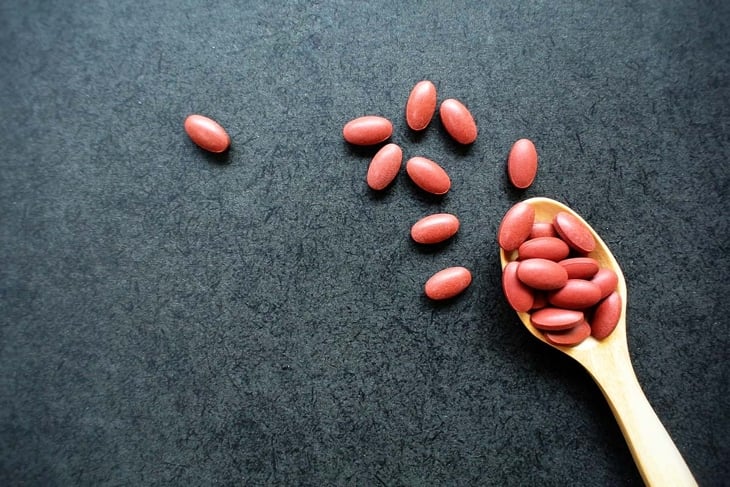
Celiac disease is an autoimmune condition that is genetic and will usually affect a person most after eating gluten (which can be found in many foods, like bread and pasta).
When the gluten reaches the small intestine, the body will recognize the gluten as a foreign invader and launch an immune response to attack the gluten. Read on for 10 symptoms of celiac disease.
Headache

If you usually get a headache a few hours after eating gluten, this can be a telltale sign of celiac disease. It is recommended to speak with your doctor to get tested if you feel you could have this condition. If you have already been tested and do not have celiac disease, ginger is a great way to help with migraine relief. In one study, patients that took 250 mg of ginger found that it helped reduce migraine pain.
Bloating and gas

Since the body attacks gluten when it enters into the small intestine, bloating and gas are a common symptom and a way to tell that something is going on within your body. First try cutting out gluten, and if discomfort persists afterward, you can try switching to a low-fructose diet that contains fruit and veggies to support your gut health.
Some fruits and veggies that support a healthy gut include avocado, broccoli, and grapefruit. Papayas have a high water content, which promotes healthy digestion and regular bowel movements.
Fatigue

Whether you’ve had an intense workout or a stressful day at work, fatigue happens to everyone. However, if you experience chronic fatigue, celiac disease could be to blame. Celiac disease can also lead to a magnesium decrease in the body, so you may want to add magnesium tablets to your diet to see if this helps with your energy. Studies have shown an association between low magnesium and chronic fatigue.
Weight loss

Losing weight without changing your diet or exercise routine could signal a problem. Weight loss with celiac disease is due to the body not absorbing nutrients correctly. Try adding nuts to your diet; they are great for maintaining gut health. Nuts help aid the good bacteria in your stomach, and in turn allow for more nutrient absorption and produce fatty acids that help prevent obesity.
If you have lost more than 5 percent of your weight within six months, this could indicate a problem, and you should see a doctor for an evaluation.
Nausea and Vomiting

If you experience nausea and vomiting, celiac disease may be to blame. However, if these symptoms occur for more than two days, see a health care provider to diagnose the problem. Ginger is a herb that has been known to help prevent nausea. Whether you drink ginger tea or snack on ginger chews, these may help curb that nauseous feeling.
Diarrhea

Diarrhea is a digestive problem that is quite common. Likewise, gas-related symptoms (bloating, belching, or flatulence) are normal and common. If this tends to happen after eating gluten, however, then celiac disease might have a hand in your tummy troubles. Try peppermint (which is known to help resolve diarrhea symptoms) or psyllium (which is packed with fiber to help regulate stools).
Iron deficiency anemia

Anemia is when the blood doesn’t carry enough red blood cells, whereas iron deficiency anemia is usually caused by not having enough iron in the body or from blood loss. Celiac disease can lead to malnutrition (because your body won't absorb all the nutrients in the food that is digesting), and the malnutrition can lead to anemia.
Women are more prone to getting iron deficiency anemia due to childbirth and menstrual cycles. Chat with your health care practitioner to see if iron supplements would be helpful for you.
Bone or joint pain

There are quite a few reasons that you could have bone or joint pain. Celiac disease is one condition that causes pain, but there are other conditions such as arthritis, musculoskeletal disorder, or osteoarthritis. If untreated, celiac disease can cause bone loss which can result in osteoporosis.
If you do suffer from joint or bone pain, consider adding chondroitin supplements to your diet. Chondroitin is a substance that is found in the cartilage in our bodies. As a supplement, this acts as an anti-inflammatory to help calm the pain of arthritis.
Tingling or numbness in the hands and feet

Tingling in the hands and feet, especially if it hits you quickly, can seem alarming, and yet this can be another sneaky symptom of celiac disease. Of course, even if you have tingling or numbness, it doesn’t necessarily mean celiac disease is the cause. Sometimes it can be a symptom of not getting enough vitamins.
Celiac disease can also cause a vitamin B12 deficiency. If this is the case, then try adding in more vitamin B12. You can add a vitamin B12 supplement or find this vitamin in eggs, dairy, meat, poultry, and fish.
Infertility or recurring miscarriages

If you have been struggling with fertility issues or have had multiple miscarriages, celiac disease may be to blame. You should see your doctor right away if you have had two miscarriages or more in a row. If you’re unable to get pregnant, it is recommended to wait at least one year if you are 34 years old or younger, and if over the age of 35, wait six months before contacting a fertility specialist.





